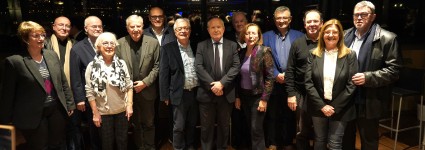Budapest Mayor Gergely Karácsony has called on Europe to help create the conditions needed to rebuild democracy, social cohesion and the rule of law in his country. The mayor of the Hungarian capital is one of the main opponents of the regime of Prime Minister Viktor Orbán, who has ruled Hungary with an absolute majority since 2010.
Gergely Karácsony has taken part in the dialogue "Preserving Democracy and Fundamental Rights in Europe" as part of the "What Europe Do We Want?" organized by the Fundació Catalunya Europa with the support of the European Parliament.
The opening of the event, which was held at the Saló de Cent of Barcelona City Council, was given by the mayor Ada Colau, and was attended by the director of the Fundació Catalunya Europa, Pau Mas, and the journalist Xavier Mas de Xaxàs who moderated the dialogue with the mayor of Budapest. The event was held in person and was also broadcast online through the YouTube channel of the Fundació Catalunya Europa.
In his speech, the mayor of Budapest and leader of the Green Party Dialogue (Párbeszéd) denounced the situation of poverty, social inequality, violation of fundamental rights and the democratic setback that Hungary is experiencing under the ultra-conservative regime of the country's prime minister. , Viktor Orbán.
"Democracy cannot work if the population cannot live in conditions, if the education system is the worst in Europe or public health services are inaccessible. Europe should understand that democracy can only take root if society It is united and citizens can live on decent economic conditions, services and wages. If poverty settles in a society, it will be difficult for it to take root in democracy. If there are many social differences, democracy dies", said Gergely. Karácsony setting the example of what is happening in his country.
Faced with this situation, the Prime Minister of Hungary, Viktor Orbán, "has been able to capitalize on social frustration to build a populist discourse and a patriotic policy that leads nowhere, transforming nationalist sentiment into anti-European nationalist sentiment."
"That's why it's important to build cohesive, inclusive societies in which citizens feel part of a united city or country project. And to make that possible, we need allies around the world, such as Barcelona, ??which it is a very important one for Budapest", added Gergely Karácsony, who has ruled the Hungarian capital since winning the 2019 local elections.
"In Budapest we are trying to restore our political immune system to the virus of right-wing populism that Prime Minister Viktor Orbán has been bringing to Hungarian politics for more than a decade".
In fact, opposition to Viktor Orbán's regime is so great that up to six different parties, with a wide ideological diversity, from left to right, have joined together to run under the same candidacy with the goal of winning the next general election on April 3rd. "After the fall of the Berlin Wall in 1989, we did not think we would experience a democratic involution like the one we are currently suffering". That is why "all parties are united by a common moral basis, and it is very important for Hungary to share a European identity". A long-standing challenge, as "with the fall of communism, many Eastern countries, such as Hungary, failed to build their own identity and began to look to Europe and Brussels, as before. they did with Moscow".
While the mayor is confident of victory in the general election, he fears Viktor Orbán's reaction "that he could act like Donald Trump, mobilizing his supporters to prevent a change of government, as he did when he lost the election on 2002". In addition, "the situation in Hungary is worse than in the United States, because in our country there is no separation of powers and Orbán controls all state institutions, political and judicial".
In this regard, the Mayor of Budapest also recalled that in the coming days the Court of Justice of the European Union will rule on the “systematic violation of the rule of law in Hungary, which could lead to a situation with only two options: change the constitutional system or leave the European Union".
Finally, Gergely Karácsony warned that "Hungarian society is highly polarized and politically divided. That is why society needs to be pacified and the anger of its citizens reduced, which we hope to do with a change of government". "Fortunately, there is growing rejection among young people of the current government, but we need to encourage them to go to the polls, as there is a very high rate of abstention among young people".
"Barcelona is the sister city of Budapest in democratic defense"
For her part, the mayor of Barcelona, ??Ada Colau, said she was very hopeful about democratic change in Hungary, and warned of "hate speech and anti-democratic threats at the gates of Europe. "Democracies are dying for supposedly democratic processes at the hands of elected leaders. It's a shared problem that we also have close". In this sense, the mayoress gave as an example the meeting last weekend in Madrid of the Hungarian Prime Minister, Viktor Orbán, with leaders of Vox, Marine Le Pen, and other leaders of the European far right.
"This is a real international reactionary of leaders who question human rights, democracy, cut the fundamental rights of women, immigrants and who have the feminist movement and the LGTBI community in their sights", said Ada Colau. "It is essential that all Democrats have a clear line between us and the far right. We cannot normalize far-right forces with pacts that give them access to institutions", she added. In contrast, Ada Colau has celebrated the symbol of hope represented by her Hungarian counterpart after the victory in the 2019 Budapest municipal elections. "Opening the door to change in Hungary. His is a victory for the cities, for the union of the Democrats and for the demand for diversity".
Ada Colau concluded her speech by stating that "Barcelona is the sister city of Budapest and we will always be together to continue to conquer rights, expand freedoms and defend a better future for our sons and daughters".
"We need to strengthen the European project and promote greater political integration"
In the institutional presentation of the dialogue held at the Saló de Cent of Barcelona City Council, the director of the Fundació Catalunya Europa, Pau Mas, stated that "Europe is at a delicate moment. The challenges are enormous: Brexit , the pandemic, climate change, or now the conflict in Ukraine, which is why we need to strengthen the European project and push for greater political integration in the face of reactionary political forces that are constantly questioning and threatening the very foundations of the EU, democracy, fundamental rights, the separation of powers and the rule of law". In this context, Pau Mas has defended the need to create spaces for dialogue and reflection such as the cycle of debates on the challenges of Europe organized by the Fundació Catalunya Europa with the support of the European Parliament.











